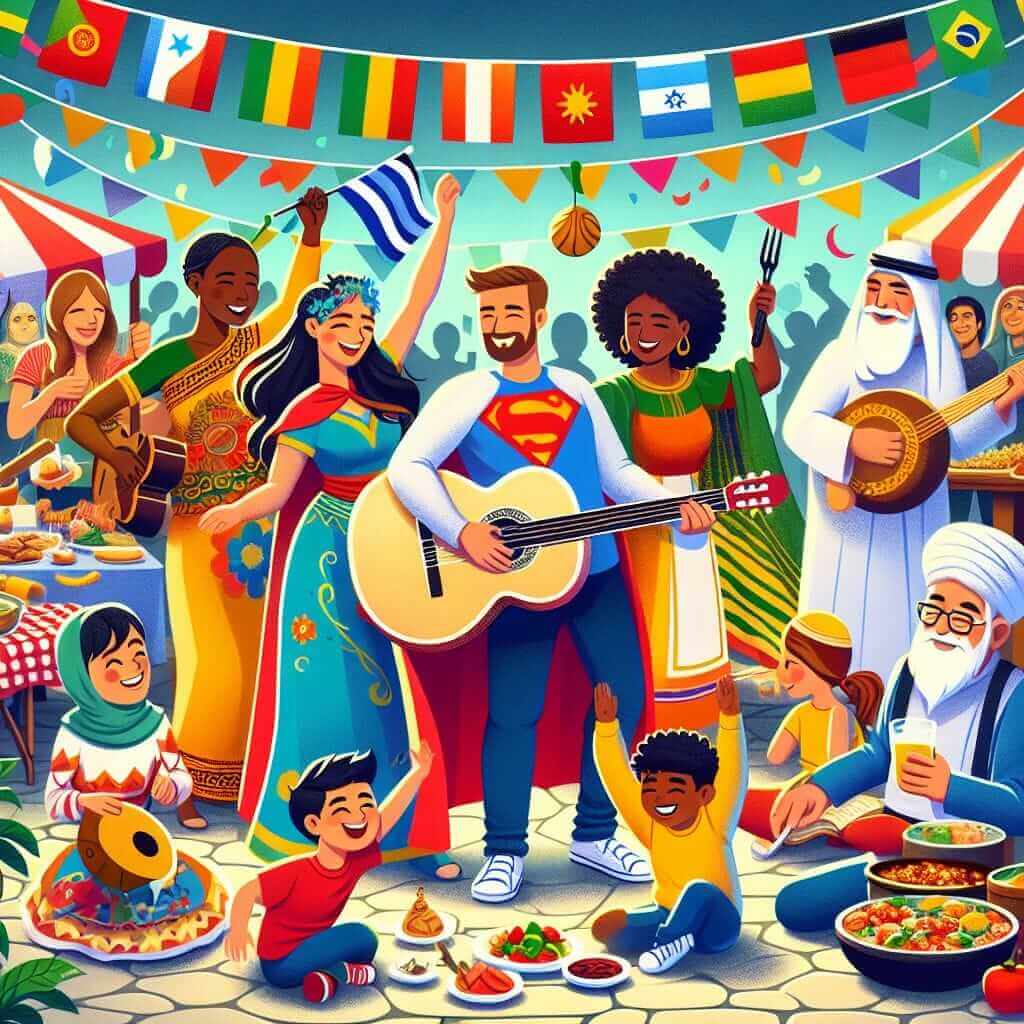The IELTS Reading section can be quite challenging due to the variety of topics it encompasses. One recurrent theme in the IELTS Reading exams is cultural festivals and their impact on community building. This topic is increasingly relevant as it touches on social cohesion, cultural heritage, and community solidarity—all of which are vital in our globalized world. Based on past data and the cyclical nature of IELTS topics, there’s a high probability that this theme could resurface in future exams.
Nội dung bài viết
- Reading Passage
- Cultural Festivals: Pillars of Community Cohesion
- Historical Importance of Cultural Festivals
- Economic and Social Benefits
- Case Studies and Modern Examples
- Practice Questions
- Reading Questions: (Choose Medium Text Difficulty)
- 1. Multiple Choice Questions
- 2. Identifying Information (True/False/Not Given)
- 3. Matching Information
- Answer Key and Explanations
- Multiple Choice Answers:
- Identifying Information:
- Matching Information:
- Common Mistakes
- Vocabulary
- Grammar Focus
- Expert Tips for High IELTS Reading Scores
In this article, we will provide a comprehensive guide and a practice reading test on the role of cultural festivals in community building. The guide includes a full reading passage, questions, answers, vocabulary, and grammar tips to help you excel in this section.
Reading Passage
Cultural Festivals: Pillars of Community Cohesion
Cultural festivals are more than mere celebrations; they are critical in fostering a sense of identity and unity within communities. Festivals provide a platform for individuals from varying backgrounds to come together and share their cultural practices, leading to increased understanding and acceptance.
Historical Importance of Cultural Festivals
From ancient times to the modern era, festivals have played a pivotal role in strengthening social bonds. Historical records across civilizations provide ample evidence of festivals being central to societal rituals and customs. For example, the ancient Greeks celebrated Dionysian festivals, which were foundational for social cohesion and public morale.
Economic and Social Benefits
Besides cultural enrichment, festivals often serve as economic catalysts. Local economies benefit from increased tourism, and small businesses flourish during festival seasons. Moreover, festivals can act as social equalizers, providing free events and activities accessible to all socioeconomic classes.
Case Studies and Modern Examples
Modern case studies illustrate the continued relevance of festivals. Take, for instance, the Notting Hill Carnival in London, which annually draws over a million attendees, celebrating Caribbean culture while boosting local businesses and fostering community spirit. Similarly, the Diwali festival in India rejuvenates not only the cultural spirit but also gives a significant thrust to the economy with its massive consumer spending.
Practice Questions
Reading Questions: (Choose Medium Text Difficulty)
1. Multiple Choice Questions
-
What is one of the primary roles of cultural festivals mentioned in the passage?
- A. Economic growth
- B. Agricultural development
- C. Technological advancement
- D. Political stability
-
Which festival is mentioned as drawing over a million attendees annually?
- A. Diwali
- B. Mardi Gras
- C. Notting Hill Carnival
- D. Oktoberfest
2. Identifying Information (True/False/Not Given)
- Historical records indicate that ancient Greeks did not celebrate festivals.
- Cultural festivals can act as social equalizers by offering free events.
- The Diwali festival in India has no economic impact according to the passage.
3. Matching Information
Match the following benefits to their descriptions in the passage:
- A. Cultural enrichment
- B. Economic catalyst
- C. Social equalizer
- Provides activities accessible to all socioeconomic classes
- Leads to increased understanding and acceptance among community members
- Boosts local business and tourism
Answer Key and Explanations
Multiple Choice Answers:
- A. Economic growth – The passage discusses how festivals contribute to the local economy.
- C. Notting Hill Carnival – This festival is noted for its large annual attendance.
Identifying Information:
- False – The passage states that the ancient Greeks did celebrate festivals.
- True – The passage mentions that festivals provide free events, making them accessible to all socioeconomic classes.
- False – The passage highlights the economic impact of Diwali in India.
Matching Information:
- C. Social equalizer – Describes providing activities for all classes.
- A. Cultural enrichment – Relates to understanding and acceptance.
- B. Economic catalyst – Concerns boosting local businesses and tourism.
Common Mistakes
When tackling reading passages:
- Skimming: Always skim the passage first to get a general idea.
- Key Words: Focus on key words in the questions to locate answers.
- Paraphrasing: Questions often paraphrase the text; be prepared to recognize different expressions of the same idea.
Vocabulary
Cohesion (noun) /kəʊˈhiː.ʒən/ – the action or fact of forming a united whole.
Catalyst (noun) /ˈkæt.ə.lɪst/ – a substance that increases the rate of a chemical reaction without itself undergoing any permanent chemical change; something that precipitates an event.
Thrust (noun) /θrʌst/ – a forceful attempt to achieve something.
Grammar Focus
Introductory Phrases: Using introductory phrases correctly is vital for written English. For example, in sentences like “From ancient times to the modern era, festivals have played a pivotal role in strengthening social bonds,” the part before the comma is the introductory phrase.
Form: [Introductory phrase + comma + main clause]
Example: Despite the rain, the festival was a huge success.
Expert Tips for High IELTS Reading Scores
- Practice Skimming and Scanning: Quickly skim for the main idea and scan for specific information.
- Understand Question Types: Familiarize yourself with various question types and practice them.
- Improve Vocabulary and Grammar: Enhance your vocabulary and grammar, focusing on words and structures commonly found in academic texts.
- Regular Practice: Make consistent practice a habit, solving diverse passages.
For more insights into cultural heritage and its influence on community development, explore articles such as Cultural Heritage and Economic Development and Cultural Heritage Preservation.

By incorporating these techniques and consistent practice, you’re on your way to achieving an excellent score in the IELTS Reading section. Good luck!